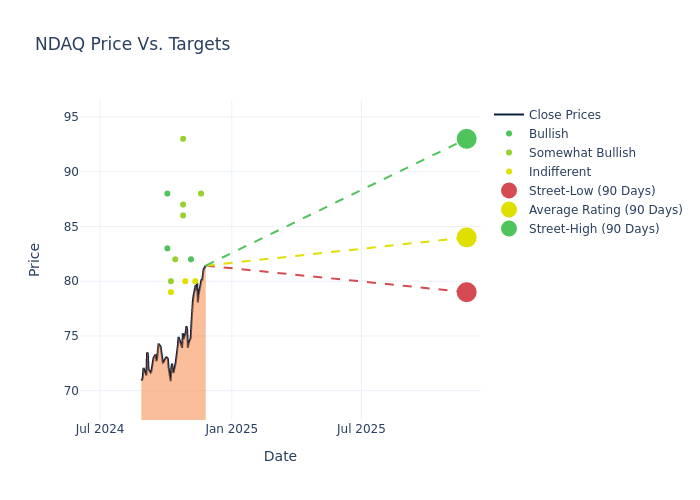
21 analysts have shared their evaluations of Nasdaq (NASDAQ:NDAQ) during the recent three months, expressing a mix of bullish and bearish perspectives.
The following table provides a quick overview of their recent ratings, highlighting the changing sentiments over the past 30 days and comparing them to the preceding months.
| Bullish | Somewhat Bullish | Indifferent | Somewhat Bearish | Bearish | |
|---|---|---|---|---|---|
| Total Ratings | 4 | 13 | 4 | 0 | 0 |
| Last 30D | 0 | 0 | 0 | 0 | 0 |
| 1M Ago | 1 | 1 | 2 | 0 | 0 |
| 2M Ago | 2 | 11 | 2 | 0 | 0 |
| 3M Ago | 1 | 1 | 0 | 0 | 0 |
Analysts' evaluations of 12-month price targets offer additional insights, showcasing an average target of $85.0, with a high estimate of $93.00 and a low estimate of $79.00. This upward trend is apparent, with the current average reflecting a 5.88% increase from the previous average price target of $80.28.

Breaking Down Analyst Ratings: A Detailed Examination
The standing of Nasdaq among financial experts is revealed through an in-depth exploration of recent analyst actions. The summary below outlines key analysts, their recent evaluations, and adjustments to ratings and price targets.
| Analyst | Analyst Firm | Action Taken | Rating | Current Price Target | Prior Price Target |
|---|---|---|---|---|---|
| Ashish Sabadra | RBC Capital | Maintains | Outperform | $88.00 | $88.00 |
| Brian Bedell | Deutsche Bank | Raises | Hold | $80.00 | $78.00 |
| Kevin Heal | Argus Research | Raises | Buy | $82.00 | $76.00 |
| Bill Katz | TD Cowen | Lowers | Hold | $80.00 | $81.00 |
| Benjamin Budish | Barclays | Raises | Overweight | $87.00 | $84.00 |
| Ashish Sabadra | RBC Capital | Maintains | Outperform | $88.00 | $88.00 |
| Owen Lau | Oppenheimer | Raises | Outperform | $86.00 | $84.00 |
| Michael Cyprys | Morgan Stanley | Raises | Overweight | $93.00 | $92.00 |
| Michael Cyprys | Morgan Stanley | Raises | Overweight | $92.00 | $85.00 |
| Patrick O'Shaughnessy | Raymond James | Announces | Outperform | $82.00 | - |
| Owen Lau | Oppenheimer | Raises | Outperform | $84.00 | $80.00 |
| Alex Kramm | UBS | Raises | Neutral | $79.00 | $73.00 |
| Ashish Sabadra | RBC Capital | Maintains | Outperform | $88.00 | $88.00 |
| Richard Repetto | Piper Sandler | Raises | Overweight | $80.00 | $73.00 |
| Benjamin Budish | Barclays | Raises | Overweight | $84.00 | $77.00 |
| Craig Siegenthaler | B of A Securities | Lowers | Buy | $88.00 | $90.00 |
| Alexander Blostein | Goldman Sachs | Raises | Buy | $83.00 | $77.00 |
| Ashish Sabadra | RBC Capital | Announces | Outperform | $88.00 | - |
| Bill Katz | TD Cowen | Announces | Hold | $83.00 | - |
| Owen Lau | Oppenheimer | Raises | Outperform | $80.00 | $78.00 |
| Craig Siegenthaler | B of A Securities | Raises | Buy | $90.00 | $53.00 |
Key Insights:
- Action Taken: Analysts frequently update their recommendations based on evolving market conditions and company performance. Whether they 'Maintain', 'Raise' or 'Lower' their stance, it reflects their reaction to recent developments related to Nasdaq. This information provides a snapshot of how analysts perceive the current state of the company.
- Rating: Gaining insights, analysts provide qualitative assessments, ranging from 'Outperform' to 'Underperform'. These ratings reflect expectations for the relative performance of Nasdaq compared to the broader market.
- Price Targets: Analysts navigate through adjustments in price targets, providing estimates for Nasdaq's future value. Comparing current and prior targets offers insights into analysts' evolving expectations.
Considering these analyst evaluations in conjunction with other financial indicators can offer a comprehensive understanding of Nasdaq's market position. Stay informed and make well-informed decisions with our Ratings Table.
Stay up to date on Nasdaq analyst ratings.
Unveiling the Story Behind Nasdaq
Founded in 1971, Nasdaq is primarily known for its equity exchange, but in addition to its market-services business (about 35% of sales), the company sells and distributes market data as well as offers Nasdaq-branded indexes to asset managers and investors through its information-services segment (30%). Nasdaq's corporate-services business (20%) offers listing services and related investor relations products to publicly traded companies and through the company's market technology group (15%), Nasdaq facilitates the exchange operations of other exchanges throughout the world and provides financial compliance services.
Nasdaq's Financial Performance
Market Capitalization Highlights: Above the industry average, the company's market capitalization signifies a significant scale, indicating strong confidence and market prominence.
Revenue Growth: Over the 3 months period, Nasdaq showcased positive performance, achieving a revenue growth rate of 31.08% as of 30 September, 2024. This reflects a substantial increase in the company's top-line earnings. When compared to others in the Financials sector, the company excelled with a growth rate higher than the average among peers.
Net Margin: Nasdaq's net margin lags behind industry averages, suggesting challenges in maintaining strong profitability. With a net margin of 16.09%, the company may face hurdles in effective cost management.
Return on Equity (ROE): Nasdaq's ROE lags behind industry averages, suggesting challenges in maximizing returns on equity capital. With an ROE of 2.79%, the company may face hurdles in achieving optimal financial performance.
Return on Assets (ROA): Nasdaq's ROA falls below industry averages, indicating challenges in efficiently utilizing assets. With an ROA of 1.01%, the company may face hurdles in generating optimal returns from its assets.
Debt Management: Nasdaq's debt-to-equity ratio stands notably higher than the industry average, reaching 0.93. This indicates a heavier reliance on borrowed funds, raising concerns about financial leverage.
Analyst Ratings: Simplified
Analysts work in banking and financial systems and typically specialize in reporting for stocks or defined sectors. Analysts may attend company conference calls and meetings, research company financial statements, and communicate with insiders to publish "analyst ratings" for stocks. Analysts typically rate each stock once per quarter.
Some analysts publish their predictions for metrics such as growth estimates, earnings, and revenue to provide additional guidance with their ratings. When using analyst ratings, it is important to keep in mind that stock and sector analysts are also human and are only offering their opinions to investors.
If you want to keep track of which analysts are outperforming others, you can view updated analyst ratings along withanalyst success scores in Benzinga Pro.
Breaking: Wall Street's Next Big Mover
Benzinga's #1 analyst just identified a stock poised for explosive growth. This under-the-radar company could surge 200%+ as major market shifts unfold. Click here for urgent details.
This article was generated by Benzinga's automated content engine and reviewed by an editor.







